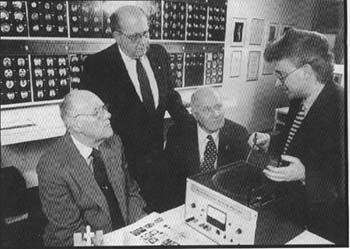
Iowa Scottish Rite Pledges Support
Of Alzheimer's Care And Research
 Antonio Damasio,
M.D., Van Allen Professor and Head of the Department of Neurology at The
University of Iowa Hospitals and Clinics (UIHC), explains assessment techniques
for understanding Alzheimer's disease to Bros. (l. to r.) Charles C. Howard,
33, Richard M. Villhauer, 32, K.C.C.H., and Harry S. Barrows, 33, S.G.I.G.
in Iowa.
Antonio Damasio,
M.D., Van Allen Professor and Head of the Department of Neurology at The
University of Iowa Hospitals and Clinics (UIHC), explains assessment techniques
for understanding Alzheimer's disease to Bros. (l. to r.) Charles C. Howard,
33, Richard M. Villhauer, 32, K.C.C.H., and Harry S. Barrows, 33, S.G.I.G.
in Iowa.
Can a person with Alzheimer's disease drive a car safely?
What can be done to help nursing assistants who experience stress and
burnout from the difficult task of caring for patients with Alzheimer's?
What can Alzheimer's patients and their families do to manage memory
and behavioral difficulties in the home?
These and other vital questions about Alzheimer's disease are being
addressed by neurological disease specialists at the University of Iowa.
with the support of the Iowa Scottish Rite Masonic Foundation and the Iowa
Scottish Rite Masons who recently presented a $50,000 check to the Alzheimer's
clinic at the University of Iowa Hospitals and Clinics (UIHC). It was the
first installment of a five-year, $250,000 commitment to the clinic through
the University of Iowa Foundation.
Addressing guests at a dedication and gift presentation on June 10,
University Hospitals Director and Chief Executive Officer R. Edward Howell
announced that the UIHC clinic that provides care for Alzheimer's patients
has been renamed the Iowa Scottish Rite Masonic Foundation Alzheimer's
Clinic.
"This action," Howell said, "underscores the pride and gratitude we
have in a partnership with the Scottish Rite Masons of Iowa to focus resources
and commitment to providing nationally preeminent health care for Alzheimer's
patients and their families."
The impact of Alzheimer's disease is staggering. According to the Iowa
Department of Elder Affairs, approximately 65,000 Iowans currently have
the disease, with that number expected to triple by the year 2010. The
total national cost of Alzheimer's disease exceeds $1.27 trillion. Because
health insurers generally cover less than 10 percent of that cost, Alzheimer's
patients and their families typically bear a tremendous financial burden.
Illustrious Harry S. Barrows, 33, S.G.I.G. in Iowa, and Illustrious
Charles C. Howard, 33, President of the Iowa Scottish Rite Masonic Foundation,
jointly presented the Scottish Rite Masons' check. Ill. Howard says, "Because
of the large number of elderly people in Iowa, we feel it is extremely
important to support the UI Alzheimer's clinic." The Masons' gift will
enable the UIHC to consolidate its multidisciplinary Alzheimer's services
and promote research.
University researchers have achieved significant Alzheimer's advances,
notably in the fields of neuroanatomy and neuropathology. Major University
of Iowa breakthroughs included new insights into which parts of the brain
are damaged by Alzheimer's disease, a study showing preserved motor learning
in Alzheimer's patients, and the development of a new Alzheimer's treatment
based on biofeedback. Ongoing research by Matthew Rizzo, MD, is addressing
the problem of driving using the Iowa Driving Simulator.
"With support from organizations like the Masons, we can build upon
our successes of the past," Dr. Damasio says. "We're excited by the potential
for significant advances in research and patient care during the coming
years."
This year's gift is not the first. Scottish Rite Masons have supported
an Alzheimer's disease fellowship in the Department of Neurology (a gift
of $25,000 annually); supported the Department of Nursing's production
and statewide distribution of a media packet for care-givers consisting
of a video and learning guide on the basics of in-home Alzheimer's care;
supported a series of seven training seminars for nursing assistants and
family caregivers; and have made an annual gift to the University's Wendell
Johnson Speech and Hearing Clinic.
The above article is reprinted in shortened form from Pacemaker,
The University of Iowa Hospitals And Clinics, Vol. 23, No. 7, July 1996.
 Antonio Damasio,
M.D., Van Allen Professor and Head of the Department of Neurology at The
University of Iowa Hospitals and Clinics (UIHC), explains assessment techniques
for understanding Alzheimer's disease to Bros. (l. to r.) Charles C. Howard,
33, Richard M. Villhauer, 32, K.C.C.H., and Harry S. Barrows, 33, S.G.I.G.
in Iowa.
Antonio Damasio,
M.D., Van Allen Professor and Head of the Department of Neurology at The
University of Iowa Hospitals and Clinics (UIHC), explains assessment techniques
for understanding Alzheimer's disease to Bros. (l. to r.) Charles C. Howard,
33, Richard M. Villhauer, 32, K.C.C.H., and Harry S. Barrows, 33, S.G.I.G.
in Iowa.